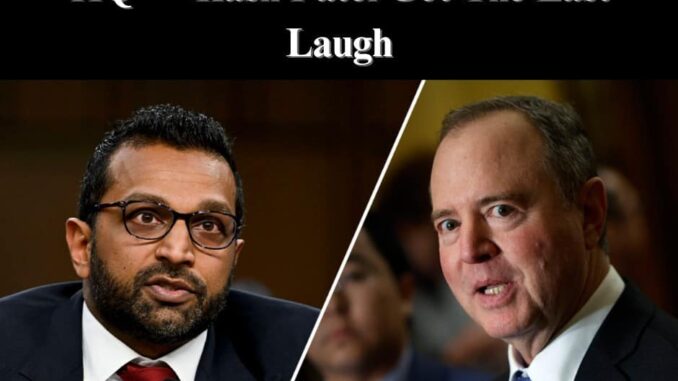
In a highly charged political moment on February 21, 2025, Senator Adam Schiff made headlines by visiting the FBI headquarters in Washington, D.C. to publicly protest the appointment of Kash Patel as the bureau’s new director—a decision that was confirmed by the full Senate just hours later. Accompanied by about six fellow Democrats, Schiff’s dramatic demonstration aimed to spotlight what he sees as serious shortcomings in Patel’s qualifications and a politicized selection process.
Schiff’s Fiery Rebuttal
Outside the imposing FBI building, Schiff did not mince words. “This is someone we cannot trust,” he declared in interviews with reporters, lambasting Patel’s record and questioning his character. Schiff argued that Patel’s background in national security—and particularly his role in debunking the “Trump-Russia collusion” narrative—rendered him unfit to lead the agency. His comments were intended to emphasize what he perceives as a dangerous departure from the core values of the FBI, which, in his view, must be free from political interference.
Schiff’s protest comes on the heels of a contentious political climate. Critics note that his public demonstration is highly political, designed not only to question Patel’s suitability but also to cast a critical light on the broader Trump administration’s policies. Conservative figures, such as Charlie Kirk, have seized on Schiff’s remarks, accusing him of deflecting attention from his own controversial record.
Patel’s Response and Vision for the FBI
Kash Patel, who was confirmed as the FBI director amid intense scrutiny, wasted no time addressing the concerns raised by his detractors. On his social media account, Patel thanked President Trump and Attorney General Pam Bondi for their “unwavering confidence and support.” Reflecting on the storied legacy of the FBI—from the days of the “G-Men” to its crucial role in post-9/11 national security—Patel pledged to restore public trust in the bureau.
His message was resolute: “The politicization of our justice system has eroded public trust—but that ends today. My mission as Director is clear: let good cops be cops—and rebuild trust in the FBI. Working alongside the dedicated men and women of the Bureau and our partners, we will rebuild an FBI the American people can be proud of.” Patel’s statements aimed to reassure the public that his leadership would prioritize integrity and accountability, even as political tensions continue to simmer.
A Broader Debate on Political Influence and Institutional Integrity
The fallout from Patel’s appointment has ignited a broader discussion about the role of politics in federal law enforcement. Schiff and other critics argue that Patel’s selection, and the process behind it, is emblematic of a politicized shift that undermines the independence of crucial institutions like the FBI. Schiff contends that Patel’s record on debunking the “Trump-Russia collusion” narrative raises concerns about potential bias and political motivations that may interfere with objective law enforcement.
Meanwhile, supporters of Patel, including some Republican lawmakers, view his appointment as a necessary step toward a more modern, efficient FBI—one that is capable of adapting to the complex challenges of contemporary national security. They emphasize that Patel’s extensive background in intelligence and his commitment to transparency are exactly what the agency needs at a time when public trust is at an all-time low.
Political Context and Public Reaction
Schiff’s protest, marked by its passionate rhetoric and high-profile location, underscores the deep partisan divisions in American politics. Critics on social media have pounced on his remarks, with some labeling his actions as a desperate political maneuver intended to deflect from his own controversies, including his rumored pre-emptive pardon from former President Biden. On the other hand, supporters argue that Schiff’s bold stand is a necessary reminder of the importance of maintaining an apolitical, merit-based law enforcement system.
The debate extends beyond personal animosities. At its core, it reflects a larger ideological struggle over how federal agencies should be staffed and led. Should decisions be made solely based on experience and integrity, or do political allegiances play an unavoidable role in shaping these appointments?
What Lies Ahead?
As the Senate’s confirmation of Kash Patel as FBI director draws to a close, the political theater surrounding the appointment is unlikely to subside anytime soon. The controversy has set the stage for ongoing debates over the influence of partisan politics on law enforcement and the future direction of the FBI. With the trial of high-profile cases and the ongoing challenges of national security, Patel’s leadership will be scrutinized not only for its operational effectiveness but also for its ability to bridge the political divides that have become all too common in Washington.
For now, Patel’s resolute message and proactive vision stand as a counterpoint to the partisan critiques. Whether his tenure will ultimately restore trust in the FBI remains to be seen, but the current political showdown highlights the deep-rooted tensions that continue to shape American governance.
What are your thoughts on Senator Schiff’s protest and Kash Patel’s appointment? Do you see this as a necessary corrective measure, or is it merely another example of partisan point-scoring? Share your views on Facebook and join the conversation on the future of our federal institutions.
In these polarized times, every appointment and every protest becomes a battleground for ideas. Let’s discuss how we can ensure that our institutions remain independent and dedicated to serving the American people.
Leave a Reply